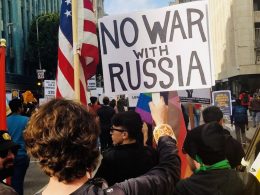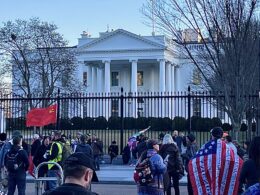The U.S. State Department and its narrative managers are trying to demoralize supporters of the anti-imperialist cause. They want us to see the contradictions in American hegemony’s challengers—whether these contradictions are real or perceived—and conclude that these sources of opposition towards the empire aren’t worth narratively assisting. At the moment, the main goal of this propaganda campaign is to discredit BRICS as a source for global leadership, which depends on cultivating the perception that the differences among the grouping’s members are too big for it to be able to weaken U.S. dominance.
To this we can say: if Russia’s special military operation hasn’t led to a breakup among Washington’s different challengers, why should we expect such a breakup to happen within BRICS?
Last year, when it wasn’t yet so apparent that Ukraine couldn’t win, the narrative managers were predicting that the war would destroy the relationship between Russia and China. They were seizing upon whatever signs of unease they could find among the two, and trying to argue that the PRC would ultimately come to find the costs of Russia’s operation intolerable. A commentator from the think tank the Asia Policy Institute concluded that “Xi no doubt wishes the whole affair could simply go away. But Russia’s flailing means he will face an increasingly stark choice: either continue to draw away from Russia and its mess, or pivot dramatically and unleash enough Chinese military assistance to make sure Russia can win decisively, setting up an epochal clash with the West. Fortunately, all signs currently point in the direction of the former.”
It’s been almost a year since this was written, and abundant evidence has appeared showing that Xi doesn’t need to decide between these two harrowing paths. He’s been able to do something else: keep softly supporting Russia, and wait for NATO to fail within the war both economically and militarily.
The “Russia and China will turn against each other” declarations were predicated on the idea that Russia’s operation would fail, which was ridiculously hubristic. There absolutely are criticisms we can make of how Putin’s government has gone about with the operation; due to the modern Russian state’s nature as a bourgeois entity, its leader has tried to minimize the amount of action it’s taken, to the detriment of the operation’s strategic success. And the government has utilized private military contractors, who’ve obviously not always acted reliably. The reason why the Russian capitalist state’s inherent flaws haven’t stopped Russia’s economy from growing amid the sanctions; or enabled Ukraine’s summer attempt at a counteroffensive to succeed; is because ultimately, this isn’t Putin’s war. This is the Russian people’s war, the action that Russia’s communists pressured the government into taking with the backing of the majority of the country.
The communists were correct in their strategic calculus that even if Russia took action against fascist Ukraine while Russia was run by a capitalist state, Ukraine and NATO would still lose. They saw how the U.S. empire was in decline, and how the pro-China geopolitical bloc which Russia represents was rising. And it was clear that Russia could rely on China to let it survive while it carried out the destruction of fascist Ukraine’s military, to the effect that Ukraine has long only been able to fight while constantly receiving insane amounts of outside aid. The Chinese-Russian partnership has done more than that, though; it’s also enabled the special operation to strengthen Beijing’s global standing, and to further weaken Washington’s.
The think tank narrative-spinners portrayed Russia as a giant, growing liability for the PRC, one whose detrimental effects on the latter could only grow more severe. But there’s a reason why Russia and China’s diplomatic relations improved around the new year following their previous moments of unease; why Chinese officials have since reaffirmed their support for Russia; why during the latest BRICS meeting, Russia’s foreign intelligence chief Sergei Naryshkin has reported there being an unprecedented sense of optimism for what this relationship can bring: “These are indeed the building blocks in the foundation of a truly free and equal world. In the near future, new bricks or poles will be added. The structure of multipolarity will continue to grow and strengthen, protecting the rights of nations to sovereignty and identity while promoting real economic development. No beast on Earth will succeed in dismantling this structure.”
Russia and China have grown closer than ever during this last year because with its becoming obvious that the Ukraine conflict can only bring NATO’s humiliation, all the ways Russia’s intervention is helping China’s strategic goals are now able to better be appreciated. It’s become clear that these benefits won’t come with caveats which are too significant; that Russia’s decision has done vastly more good than harm to the PRC.
There are still drawbacks to the decision, of course, but they’re not big enough to surpass the positives. Even with U.S. satellite states like Germany and Italy shifting towards decoupling from China, Russia’s action has catalyzed an acceleration of the rise of the BRI, among a number of other Eurasian infrastructural, economic, and currency projects which threaten to make U.S. leadership further outmoded. The conflict has made the yuan become more widely used, allowing for de-dollarization to be furthered by the conflict despite the sanctions having harmed Russia’s own currency. The costs Russia has experienced from its decision have been necessary ones; sacrifices that are ultimately worthwhile for the sake of demilitarizing a fascist state, and weakening the imperial hegemon.
The PRC, and all the formerly colonized countries that benefit from its policies, have become further advantaged due to Russia’s sacrifice. And becoming better able to bring the vast majority of the globe out of neo-colonial control is a worthwhile reward for the price of losing economic relationships with a few of the declining old colonial powers. Those dying empires are the past; Africa, Eurasia, and Latin America are the future. This is the essence of why Russia’s strategic reasoning was sound when it decided to fully defy the empire, and of why China has in the end accepted Russia as an asset rather than discarding it as a liability: we’re at a point in history where it’s easier than ever to harm the imperialists. All the ways the imperialists have retaliated against Russia can’t undo the progress that Russia’s decision has accelerated.
At this point, the only way the State Department’s narrative managers can argue that Russia and China’s relationship won’t last is by making unfalsifiable statements about the intentions of either of the two countries. Some assert that Russia will inevitably betray China, even though this would make no strategic sense for Russia to do now that it’s become more reliant on China than ever. Others assert that China is the one which can’t be trusted, and that it’s going to start oppressing Russia (a narrative predicated on the myth about China being an imperialist power). Which country these discourse actors try to portray as the antagonist depends on whether a given one of these actors is on the left or the right, with the ones on the “left” seeking to promote distrust towards Russia while the ones on the right do this with China.
The things they say are all nonsense, detached from the realities of what’s truly happening in Eurasia. While the State Department’s partisans seize upon gossip and rumors to tell a story about Washington’s challengers being headed towards fracture, these countries get more and more reasons to be unified. The recent BRICS expansion is an outcome of this increasing functionality within the relationship between Eurasia’s great powers; why would Ethiopia and Iran unite with Saudi Arabia? Because they see that the trend is towards multipolarity, and that bringing cohesion to the non-western countries is in the interest of each of these countries.
This doesn’t mean the hegemon has already been defeated in full, or had its leverage completely taken away. The latest BRICS meeting has made it apparent that many of the grouping’s members, including its newest ones, don’t want to abandon the dollar at the moment for fear of Washington retaliating against them with hybrid warfare. Most countries are not the DPRK; they’re not politically, militarily, or economically ready to accept the costs of totally disobeying the will of the great imperialist menace. This shows the limits of Russia’s operation, and of BRICS, when it comes to combating the empire; we can’t expect these things to win every part of this fight. Imperialism isn’t going to be fully defeated until the imperialist countries themselves all undergo workers revolutions, which is going to require the workers of these countries to fight off a desperate fascism.
At this stage, the most impactful thing we in the core can do is combat the empire’s psyops, as these are what keep the hegemon able to continue waging its hybrid wars and what keep the workers movement ineffectual. We’re already in the process of defeating the Ukraine psyop, which is becoming untenable as objective reality proves it to be fraudulent. Now we need to defeat the psyops designed to discredit BRICS.
Header image from Yahoo.
————————————————————————
If you appreciate my work, I hope you become a one-time or regular donor to my Patreon account. Like most of us, I’m feeling the economic pressures amid late-stage capitalism, and I need money to keep fighting for a new system that works for all of us. Go to my Patreon here.
To keep this platform effective amid the censorship against dissenting voices, join my Telegram channel.








